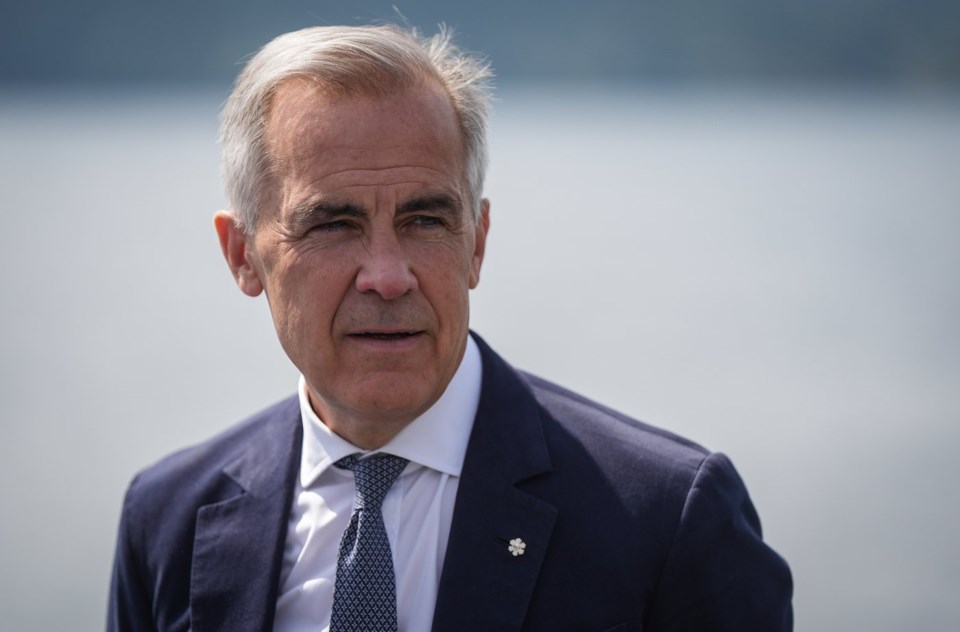OTTAWA — Prime Minister Mark Carney says Canada is dropping some retaliatory tariffs on American products to match U.S. tariff exemptions for goods covered under the Canada-United States-Mexico Agreement.
After meeting with his cabinet, Carney said at a news conference Friday that the decision will take effect on Sept. 1, 2025.
Carney had a call with U.S. President Donald Trump on Thursday, and Carney confirmed that Trump assured him the move would help kick-start trade negotiations with the U.S.
Carney said Canada and the U.S. have re-established free trade for the vast majority of goods. He said Canada will retain tariffs on steel, aluminum and autos as it works with the U.S. to resolve issues.
"Indeed, our focus is squarely on these strategic sectors and the future," he said.
Carney said the average U.S. tariff rate on the world has jumped from just over two per cent at the end of last year to almost 16 per cent.
"Canada currently has the best trade deal with the United States," Carney said, noting that the U.S. average tariff rate on Canadian goods is 5.6 per cent and remains the lowest among all its trading partners. "And while it's different from what we had before, it is still better than that of any other country."
A White House official said in a statement that the U.S. welcomes the Canada's move, calling it "long overdue."
The official said they looked forward to "continuing our discussions with Canada on the administration's trade and national security concerns."
Carney says the Canadian government will begin its preparations for the CUSMA review process due next year by launching consultations starting next month. He said the review process can take anywhere between six and 18 months.
Canada imposed 25 per cent tariffs on a long list of American goods in March, including oranges, alcohol, clothing and shoes, motorcycles and cosmetics.
A readout from Carney's office after Thursday's call with Trump described the meeting as "productive and wide-ranging."
It said the leaders talked about trade challenges and the new economic and security relationship between the two countries.
Following his conversation with Trump, Carney said Canada and the United States will "intensify" their discussions to address current trade challenges in strategic sectors and to seize "major immediate opportunities" in trade, investment and security.
"As we develop our new trade relationship with the United States, Canada will continue to take all measures necessary to support Canadian workers, our businesses and our consumers," Carney said, noting that the government will soon announce a "comprehensive industrial strategy" that protects Canadian jobs, boosts Canadian competitiveness, buys Canadian goods and diversifies Canadian exports.
Carney said the government will also soon select the first in a series of new major projects that will "connect and transform our economy."
The Canadian Federation of Independent Business said in a statement on Friday that it welcomes the decision to drop some of its retaliatory tariffs on U.S. goods.
"This is a step in the right direction and will take some of the pressure off Canadian small businesses as trade talks continue," said Corinne Pohlmann, the CFIB's executive vice-president for advocacy.
Pohlmann said many small business owners have said that Canada’s retaliatory measures were almost as damaging as the U.S. tariffs. She said nearly six in 10 small firms reported they were hurt by Canada’s counter-tariffs, with only steel and aluminum tariffs doing more harm.
"Those were not touched today, so the challenges for those businesses remain," Pohlmann said.
While small firms were in favour of Canadian counter tariffs as the trade war began, Pohlmann said their support has been falling since February.
"Today’s announcement provides some relief going forward; however, businesses have already paid millions of dollars in counter-tariffs," Pohlmann said. "We urge Ottawa to immediately release its tariff revenue to small businesses directly and indirectly affected by trade disruptions and work quickly to resolve small business requests still tied up in the remissions process."
-with files from Kelly Geraldine Malone in Washington, D.C.
This report by The Canadian Press was first published Aug. 22, 2025.
Kyle Duggan, The Canadian Press




